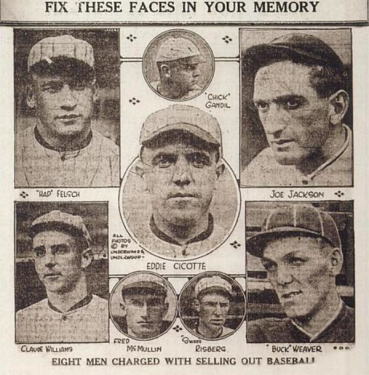
If you know longtime diocesan priest Msgr. John Bracken, you probably know that he’s a huge baseball fan, especially of the Brooklyn Dodgers.
He still has vivid memories of the “Shot Heard ’Round the World” in 1951 and of course “Dem Bums” finally capturing the World Series title in 1955. Baseball was part of the fabric of his upbringing and remains a passion for him today.
What you might not know about Msgr. Bracken is that his family has a connection to one of baseball’s most notorious scandals involving the 1919 Chicago White Sox allegedly throwing games of the World Series in exchange for money — known as the “Black Sox Scandal.”
Msgr. Bracken’s maternal grandparents were James and Agnes Carroll from Transfiguration parish in Williamsburg. In those days, lots of amateur baseball was played in the Brooklyn area, especially in the beer gardens of local breweries that happened to have their own baseball diamonds.
The Carrolls were neighbors with the Ring family. Jimmy Ring was a talented young right-handed pitcher from the parish who began gaining attention from the professional ranks. James Carroll served as a mentor to Ring, and the two developed a close friendship.
The Cincinnati Reds signed Ring prior to the 1917 MLB season. He was used sparingly his first two seasons, but in 1919, he established himself as a force in Cincy’s rotation — winning 10 games in the regular season for the Reds, who won the National League pennant and were set to face the mighty Chicago White Sox in the World Series.
The White Sox though were said to be dealing with some internal turmoil all season. A faction of players — later known as the “Eight Men Out” — were unhappy with team owner Charles Comiskey, since they thought they were being underpaid. This was a day well before the advent of free agency, so players who refused to accept a contract from their team would be prohibited from playing baseball on any other professional team.
As for the scandal, White Sox players met to discuss how they could make extra money by betting on the Reds to win the series. Rumors began swirling before Game 1 that the series was fixed, especially as bets began pouring in for the Reds.
Back then, the World Series was best of nine. The Reds won the series, 5-3, and in those eight games, there were a number of suspicious plays according to coverage by the sportswriters of the time.
Meanwhile, Msgr. Bracken’s grandfather attended each of the eight games to cheer for his mentee Ring. He took the train from Brooklyn to Cincinnati and then back and forth from Cincy to Chicago. Msgr. Bracken never met his grandfather, who died at a young age, yet his grandmother Agnes relayed this story about Ring and the scandalous series.
In Game 4, Ring threw a three-hit shutout to earn a 2-0 victory. The losing pitcher for Chicago was Eddie Cicotte, who made a key error leading to the game’s first run and raising questions about the game’s integrity. Ring also appeared in Game 6 and was the losing pitcher, though he allowed just one run in five innings of relief.
The following season, a grand jury was convened to investigate. After a trial the following year, all eight players were found not guilty. However, in his first act as new baseball commissioner, Judge Kennesaw Mountain Landis suspended the eight accused players from baseball indefinitely. The ban remains to this day.
Most notably on that list was star outfielder “Shoeless” Joe Jackson. The owner of a .356 lifetime batting average, Jackson was a lock for baseball’s Hall of Fame until his connection with the scandal. Years later though, the accused players exonerated Jackson, saying they merely wanted to have his name involved to give them more credibility.
“It’s all because Comiskey was cheap!” Msgr. Bracken said. “He didn’t want to pay them.”
As for Ring, he pitched a handful more seasons with the Philadelphia Phillies, New York Giants and St. Louis Cardinals. He eventually moved back home and became a member of St. Thomas More, Breezy Point. He died in 1965 at the age of 70.
Unfortunately, the stories of actually being at those “tainted” World Series games never fully passed down from James Carroll to Msgr. Bracken. Yet it’s no surprise that a passion for baseball developed in the young monsignor.
Contact Jim Mancari via email at jmmanc@gmail.com.
